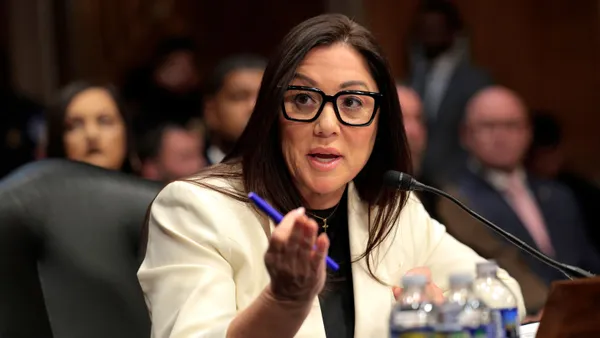Dive Brief:
- Ten Republican-led states filed a petition to block the Securities and Exchange Commission’s climate-risk disclosure rule shortly after the vote was finalized on Wednesday.
- The lawsuit, led by West Virginia Attorney General Patrick Morrisey, was filed in the U.S. Court of the Appeals for the 11th Circuit. Decisions made by most federal administrative agencies are subject to review by a Federal Court of Appeals. The attorneys general asked the court to declare the rule “unlawful” and vacate the commission’s finalization.
- Questions over the SEC’s authority have dominated the discourse around the rule, both in its proposal stage and during the final vote. Like the vote’s two dissenting commissioners, Morrisey and the suit’s co-filers argued the SEC exceeded its rulemaking authority in requiring public companies to disclose climate-related risks as part of their registrations and annual filings.
Dive Insight:
Much of the 896-page lawsuit filing is an attachment of the SEC’s 886-page final rule, which scaled back scope 1 and scope 2 reporting requirements and eliminated all scope 3 reporting requirements for companies. West Virginia is joined in the challenge by Alabama, Alaska, Georgia, Indiana, New Hampshire, Oklahoma, South Carolina, Virginia and Wyoming.
Legal challenges to the final rule were always expected, whether or not scope 3 reporting was included. Erin Martin, a partner at ESG and sustainability advisory firm Morgan Lewis, previously told ESG Dive that the omission of scope 3 would not preclude the SEC from legal challenges as there would be “significant pushback about scope 1 and scope 2 as well.”
On the other side of issue, the Sierra Club announced it was considering a legal challenge to the rule’s exclusions.
Morrisey said the states will prove “the final rule exceeds the agency’s statutory authority and otherwise is arbitrary, capricious, an abuse of discretion, and not in accordance with law,” according to the March 6 filing.
The House Financial Services Committee also scheduled two hearings on the final rule’s impact, announced the same day it was finalized. First, the committee’s Oversight and Investigations subcommittee will hold a field hearing March 18, “to hear directly from Americans who will be impacted by this disastrous rule,” before a full committee hearing on April 10.
House Financial Services Committee Chair Patrick McHenry argued that the agency must re-propose the rule due to the “substantial changes” from the proposal.
“Despite what Chair Gensler says, this rule will still have immense consequences for our capital markets and economy as a whole,” McHenry said in the release. “Chair Gensler is overstepping his statutory authority, piling on massive new compliance costs that will be destructive to workers, investors, and job creators alike.”
After the rule was finalized, Chair Gary Genser told reporters that a re-proposal is a process the agency has not done “in decades,” and he believes all the agency’s actions on the rule are in line with the procedures laid out by the Administrative Procedure Act.
An SEC spokesperson reiterated that view Friday in an emailed statement to ESG Dive, and said the agency “will vigorously defend the final climate risk disclosure rules in court.”
Commissioner Jaime Lizárraga, who cast the rule’s deciding vote, said during the Wednesday hearing that the agency was well within its authority and the finalized climate-related disclosure rules were “no different from many of the commission’s existing disclosure requirements.”
“The commission is doing what it was designed to do: Protect investors and foster transparent capital markets by improving the reliability, consistency and comparability and material climate risk disclosures for investors,” Lizárraga said.












